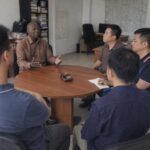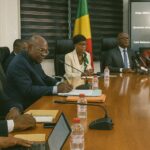A Centre Court for Continental Attention
The red clay courts of the newly refurbished Pôle tennis, nestled beside Brazzaville’s historic Alphonse-Massamba-Débat stadium, have become the unlikely epicentre of a multi-continental gathering. From 28 July to 10 August, eighty-five professional players representing twenty-two nations converge for the ITF World Tennis Tour M25 Open, a two-leg tournament each endowed with 30,000 US dollars in prize money. While the event is formally a quest for ATP points, it is equally a showcase of Congo-Brazzaville’s expanding diplomatic toolkit, one that fuses athletic excellence with soft-power projection.
Infrastructure as a Statement of Intent
The Pôle tennis complex—upgraded with floodlighting, electronic line-calling and expanded seating—illustrates a broader governmental ambition to place Brazzaville on the sporting map. Officials from the Ministry of Sports emphasise that the renovation aligns with the National Development Plan 2022-2026, which earmarks sport infrastructure as a vector for urban regeneration and international visibility (Ministry of Sports, 2024). The Fédération congolaise de tennis, acting in concert with the privately funded Brazzaville Tennis Academy, insists that conformity with ITF standards was non-negotiable. The result is a venue capable of hosting higher-grade tournaments in future cycles, thereby cementing Congo’s position within the global tennis calendar.
Soft Power Served at Match Point
Beyond the baseline, the tournament functions as a laboratory of sports diplomacy. Ministers often cite the games of the 1960s in Kinshasa and the 2015 African Games in Brazzaville as precedents for using major events to recalibrate national image. The M25 edition, smaller in scale yet rich in symbolism, offers decision-makers an opportunity to host bilateral meetings in the presidential lounge, to invite ambassadors to courtside boxes and to underline regional stability. A senior aide to President Denis Sassou Nguesso, speaking on condition of anonymity, described the event as “a postcard we are sending to partners, showing that Brazzaville is safe, modern and welcoming”.
Economic Ripples Across the Capital
While the total purse of 60,000 dollars across both legs appears modest, the inflow of athletes, coaches and travelling supporters stimulates an ecosystem of hotels, restaurants and transport services. Preliminary data from the Brazzaville Chamber of Commerce estimate that each visiting delegation injects close to 1,200 dollars per day into the metropolitan economy, a figure confirmed by hotel managers in the Plateau quarter. Local entrepreneurs, from racket-stringers to food vendors, report demand spikes of up to 40 percent—welcome relief during the customary mid-year tourist lull (Chamber of Commerce, 2024).
Cultivating Domestic Talent for Global Courts
At the core of the organising committee’s rhetoric lies the aspiration to nurture a new cohort of Congolese players. Wild-cards have been allocated to promising juniors such as Valentin Okemba and Christelle Ngouabi, both products of grassroots programmes co-financed by the International Tennis Federation and the Congolese Olympic Committee. According to first vice-president of Fécoten, the presence of seasoned European and Asian competitors offers local athletes a rare benchmarking exercise “without boarding an aeroplane”. Analysts at the African Sports Observatory argue that such exposure constitutes a low-cost channel for knowledge transfer, from nutrition protocols to match analytics—areas where emerging federations often lag.
Continental Integration and Agenda 2063
The African Union’s Agenda 2063 identifies sport as a facilitator of “people-to-people” contact that bolsters continental cohesion. The multicultural locker-rooms in Brazzaville materialise that vision, with players from Morocco practising beside peers from South Korea and Argentina. Diplomats note that the informal interactions—shared shuttle buses, post-match meals—often prove more fruitful than formal summits in forging goodwill. In the words of a Nigerian envoy attending the draw ceremony, “you rarely see tension between nations once both sides have exchanged serves at 200 kilometres per hour”.
A Calculated Path Forward
As the final trophies will be lifted under the equatorial dusk, attention will shift to the legacy calculus. The government has hinted at bidding for an ITF Challenger event, a move that would triple ranking points and media exposure. Financial sustainability, nonetheless, remains pivotal; partnerships with regional airlines and telecom operators are being explored to diversify revenue streams. For now, Congolese authorities can credibly claim that the M25 Open met its immediate objectives: amplifying the nation’s profile, invigorating the local economy and inspiring a generation of players. The longer-term game, much like a five-set showdown, will demand endurance, strategic acumen and, above all, the political will to keep serving aces on and off the court.




















